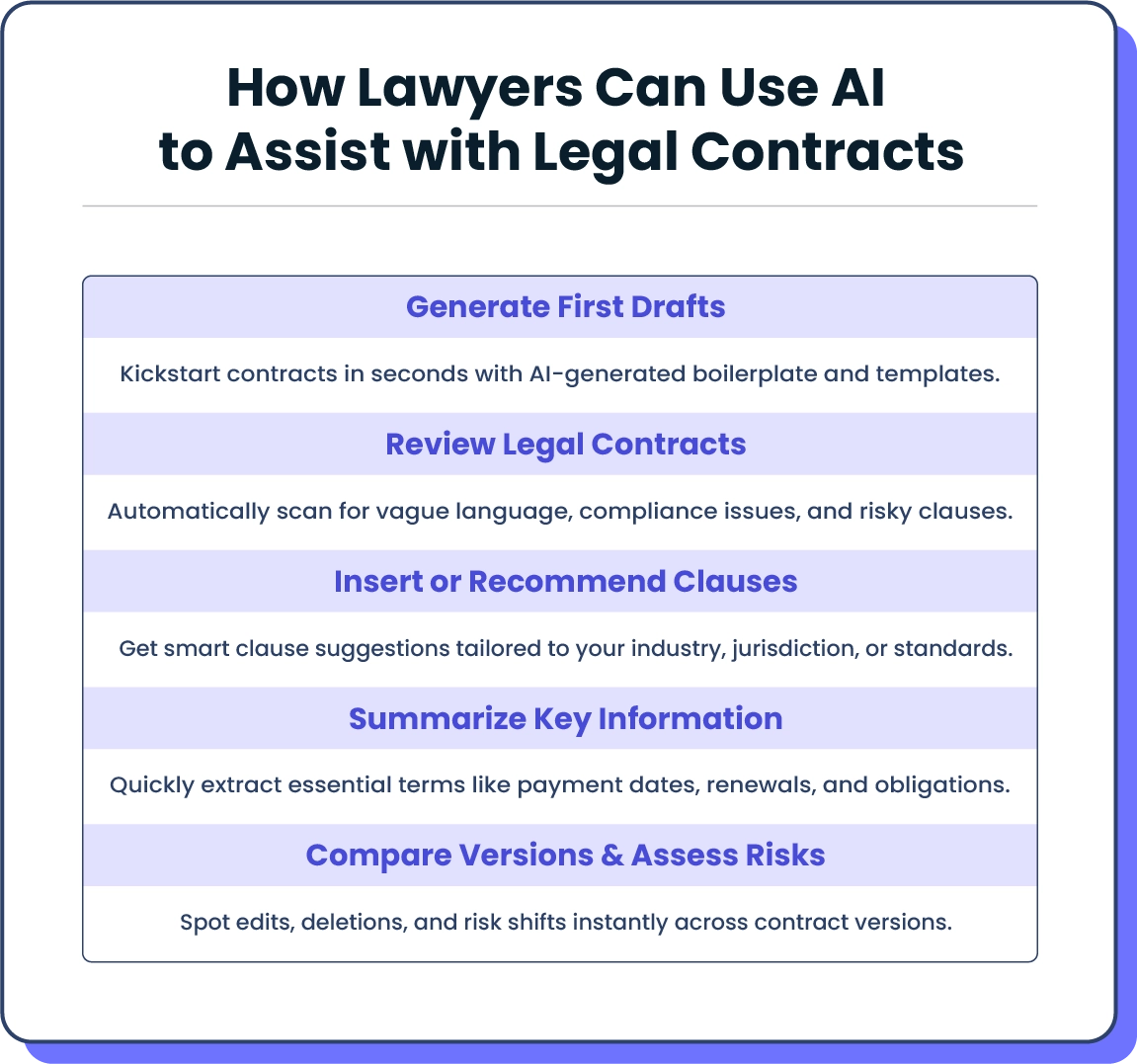What if you could cut hours from your contract drafting process, without cutting corners? That’s exactly what more legal professionals are doing by tapping into the power of artificial intelligence (AI).
From generating contract language in seconds to flagging risky clauses before they become problems, AI tools are transforming how lawyers work. And the momentum is real: 31% of legal professionals now use generative AI in their daily practice, and nearly 30% of firms not yet using it plan to adopt it by fall 2025, according to the MyCase 2025 Legal Trends Report.
This guide explores how AI for legal contracts is reshaping contract creation, review, and risk analysis, helping lawyers deliver better results while improving business efficiency.
How Can Lawyers Use AI to Assist With Legal Contracts?
AI can support every stage of contract work—from generating first drafts to redlining, summarizing, and comparing versions. With the help of generative AI for legal contracts, attorneys can work more efficiently while still maintaining full oversight. It's not about replacing legal expertise; it's about empowering it.
Below are a few examples of how lawyers can use AI to enhance their legal contracts process.
Generate First Drafts
AI tools can quickly generate boilerplate sections or contract drafts using natural language prompts, pre-built templates, or your firm’s historical documents. This means lawyers no longer have to start from a blank screen—AI can provide a structured first draft that covers routine elements like indemnity clauses, payment terms, or confidentiality provisions. While attorneys still need to tailor these drafts to meet client needs and legal nuances, AI significantly shortens the path from idea to working document.
Review Legal Contracts
AI legal contract analysis software accelerates the review process by automatically scanning contracts for vague, non-compliant, or risky language. These tools can detect missing clauses, highlight deviations from standard templates, and flag provisions that may introduce liability.
This level of precision not only improves accuracy but also reduces the mental fatigue that can lead to oversight, making it easier for attorneys to focus on higher-risk issues and strategic recommendations.
Identify and Insert Clauses
The best legal AI tools don’t just review—they also recommend. Based on the contract’s content, jurisdiction, or industry, AI can suggest commonly used clauses or custom language that aligns with your firm’s best practices. Solo practitioners and small firm lawyers who may not have access to a robust clause library or knowledge management resources will find this particularly valuable.
With a few clicks, lawyers can insert appropriate provisions and ensure a legal contract is complete and aligned with precedent.
Summarize Key Information
AI-powered summarization tools sift through dense legal documents and distill them into clear, digestible overviews. They extract essential terms—like payment schedules, renewal dates, liability caps, and key obligations—and present them in an easy-to-scan format. This not only speeds up internal reviews but also makes it easier to share insights across teams, such as with finance, operations, or sales colleagues who need to understand the key points without reading the full agreement.
Compare Versions and Assess Risks
AI contract comparison tools allow lawyers to instantly identify changes between different contract versions. These tools go beyond simple redlining by highlighting subtle language changes, spotting deletions or insertions, and correcting deviations from approved templates or firm standards. They can even assess whether certain changes increase legal or business risk.
Using AI in this way helps attorneys maintain control over negotiations, avoid surprises, and protect clients from inadvertently agreeing to unfavorable terms.

What Are Some of the Best AI Tools for Legal Contracts?
There are dozens of AI platforms available, but these five stand out for legal contract work:
1. Spellbook
Spellbook layers AI onto Microsoft Word, helping lawyers draft contracts directly within their workflow. It suggests language, highlights risky terms, and even answers questions about the contract. It’s particularly popular with solo attorneys and small firms.
2. Ironclad
Ironclad combines contract lifecycle management with legal AI. It helps legal teams automate contract workflows, identify bottlenecks, and maintain version control. It’s ideal for in-house legal departments and midsize firms handling a high volume of contracts.
3. Juro
Juro offers an all-in-one platform that supports AI-assisted contract creation, collaboration, and approvals. It’s known for its user-friendly interface and is best suited for legal teams working closely with sales or operations.
4. LegalOn
LegalOn focuses on AI-powered contract review and risk analysis. It flags problematic clauses, suggests fixes, and keeps its model updated with the latest legal trends and rulings. It’s especially useful for firms managing NDAs, MSAs, and vendor agreements at scale.
5. Luminance
Luminance brings machine learning to legal contract analytics. It excels in compliance reviews, M&A due diligence, and benchmarking. Large firms and global legal teams use it for document-heavy projects where speed and accuracy are critical.
Benefits of Using AI in Legal Contract Work
AI is often praised as a time saver (which it is), but it’s also a strategic asset. When applied thoughtfully, AI for legal contracts can significantly improve your firm’s productivity, accuracy, and bottom line. Here’s how:
1. Accelerate Contract Turnaround
AI enhances speed at every stage of the contract lifecycle. Whether drafting from a template, reviewing for risks, or tracking redlines, AI-powered tools can complete tasks in seconds that once took hours. Firms can respond to client needs more quickly, close deals with greater efficiency, and keep transactions moving—especially important in fast-paced industries like real estate, finance, and mergers and acquisitions.
2. Reduce Legal Review Costs
Routine contract review often comes with high labor costs, especially when senior attorneys are tasked with combing through standard provisions. AI contract review software streamlines these lower-risk tasks, allowing firms to shift valuable attorney hours toward more strategic, high-impact work—all while maintaining the quality and depth of review clients expect.
3. Improve Consistency and Accuracy
Even with careful attention, manual drafting can lead to inconsistencies across contracts. Language may vary slightly from one version to the next, increasing the risk of errors. AI tools help maintain consistency by referencing internal templates, approved playbooks, and jurisdictional norms, resulting in cleaner, more reliable documents that uphold firm standards and reduce the potential for oversight.
4. Increase Capacity Without New Hires
Expanding a legal team isn’t always feasible, especially for smaller firms with limited resources. AI makes it possible to handle more contracts using your current staff, eliminating the need for additional hires. Teams can manage higher volumes of work while avoiding overtime and reducing the risk of burnout, all without sacrificing quality or responsiveness.
5. Enhance Profitability
A more efficient legal team is a more profitable one. AI helps eliminate time-consuming administrative tasks, allowing attorneys to focus on strategic legal work, negotiations, and client counseling. With more hours spent on high-value activities, firms can improve client satisfaction and make better use of billable time, ultimately boosting margins.
Limitations and Risks of Using AI for Legal Contracts
While AI contract tools offer clear advantages, they also have important limitations. Although language generated by AI may seem legally sound at first glance, it often lacks the nuance, context, or jurisdiction-specific detail that legal professionals rely on.
Human oversight is essential to using AI responsibly. Attorneys must review outputs carefully, validate their accuracy, and apply sound legal judgment. Adopting an ethical AI approach means using these tools to enhance—not replace—professional standards, ensuring that every contract aligns with client expectations and legal obligations.
Additional risks include:
Confidentiality concerns: Not all AI tools are built with legal-grade security. When using cloud-based platforms or general-purpose AI, there’s a risk of exposing sensitive client data, especially if the tool lacks encryption, access controls, or data residency protections. Legal professionals should ensure that any AI solution complies with industry standards for confidentiality and data protection.
Biased or outdated models: AI models trained on generic, non-legal, or outdated datasets may produce inaccurate or incomplete content. These tools may overlook jurisdiction-specific requirements, evolving case law, or firm-specific preferences. Without legal-specific training data, the risk of generating incorrect or inappropriate contract language increases significantly.
Ethical compliance: Lawyers have a duty to safeguard client confidentiality, avoid unauthorized practice, and maintain professional judgment. Using AI tools requires thoughtful implementation to ensure compliance with the rules of professional conduct. This includes verifying outputs, disclosing AI use when appropriate, and choosing tools that support human oversight rather than replace it.
Should You Use AI for Legal Contracts?
If your firm handles repetitive contract work, faces tight deadlines, or has limited staff capacity, using AI to assist with legal contracts may be a valuable addition. Start with low-risk agreements (like NDAs or standard vendor contracts) and test tools with built-in controls and human-in-the-loop features.
Platforms like Spellbook or Juro offer affordable, easy-to-use solutions for solo attorneys or small firms. Larger firms or in-house teams might benefit more from robust platforms like Ironclad or Luminance.
MyCase IQ for Legal Document Summaries
While many AI tools assist with drafting and reviewing contracts, some of the biggest efficiency gains come from everyday document tasks, like summarizing, translating, or cleaning up internal memos. That’s where MyCase IQ adds value for busy legal teams.
MyCase IQ, the built-in AI assistant within MyCase, helps law firms streamline everyday document tasks and boost productivity. Lawyers can quickly summarize long documents such as demand letters or memos, refine the tone and clarity of legal correspondence, and translate text between English, Spanish, and Arabic—all without leaving the platform.
Firms save valuable time on non-billable tasks, improve internal communication, and create more consistent workflows across teams. Support staff and new hires can get up to speed faster, allowing attorneys to stay focused on higher-value work.
Curious how MyCase and MyCase IQ can support your firm’s contract workflows? Schedule a demo today and see how AI and automation can help you draft smarter, faster, and with confidence.
AI for Legal Contracts FAQs
About the author

Mary Elizabeth HammondSenior Content Writer
Mary Elizabeth Hammond is a Senior Content Writer and Blog Specialist for leading legal software companies, including MyCase, Docketwise, and CASEpeer, as well as LawPay, the #1 legal payment processor. She covers emerging legal technology, financial wellness for law firms, the latest industry trends, and more.
